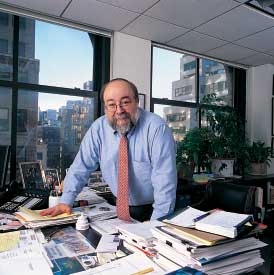On Both Sides of the Law
When Jeff Smith entered Vassar with the class of 1974—the first class to have men enrolled for all four years—“the school was maybe 20 percent male,” he said. “The odds, as they say, were in my favor. It was like dying and going to heaven.”
Many men in the legendary class of ’74 probably felt that way, but Smith had more reasons than most. He moved into Raymond House just two days after leaving Green Haven Correctional Facility in Stormville, New York, where he had spent three-and-a-half years. The story of how he got there, and how he ultimately left there to go to Vassar, is a tale of luck, both good and bad, and a lot of irony.
Having grown up on Long Island, Smith started his college career at Stony Brook University. “I really didn’t want to go to college at that time,” he said. “I got pushed into it by a guidance counselor.” After studying physics and math for a year, it was clear he’d been right—college wasn’t for him. “I think my GPA was 1.0 or something,” he said, smiling. “I didn’t fail everything, but it wasn’t stellar.” He took a leave of absence, worked at a handful of jobs, then moved to the Haight-Ashbury in San Francisco and became a self-described “’60s hippie.”
While living in San Francisco, he learned from a friend on Long Island that there had been a drug raid at Stony Brook, and that the police had been looking for him. He went back to New York and turned himself in. “I figured, what are they going to do?” he said. “They’re going to slap my hand and send me on my way. It’s just pot.”
According to the police, the informant in the drug raid had been a friend of Smith’s in high school, someone to whom he had given a little marijuana on two occasions. (By law, giving someone drugs carries the same penalty as a sale.) With the informant’s lead on a crime committed two years earlier, Smith was arrested. Police officers testified that Smith had sold the marijuana directly to them. (Ironically, this worked in Smith’s favor—since his high-school friend had been a minor, giving him drugs would have been a more serious crime.)
As Smith puts it, he was the perfect target in the investigation. Out of the 50 or so local residents and students who were arrested, he was the only former student. Everyone else arrested in the raid was permitted to plead guilty to misdemeanors, even those with more serious violations than Smith, who was charged with a felony. From Smith’s perspective, the local officials who had instigated the raid in an attempt to crack down on drug use at the university could claim to have arrested a Stony Brook student, while the university could claim that none of their current students was convicted of serious offenses. “Wrong place, wrong time, wrong guy,” said Smith.
While serving his time at Green Haven Correctional Facility, the South Forty Corporation, an organization that provided vocational services for people with criminal records, was offering what they called “imaginal education” for inmates. The philosophy was that people in prison had distorted self-images, and needed to understand themselves in order to make better decisions and avoid recidivism. Smith took a speech course through the program, and was able to obtain college credit for it through Dutchess Community College. Inspired by this, Smith—the guy with the abysmal GPA at Stony Brook—wrote a proposal suggesting that all the courses given at Green Haven could offer college credit and comprise a degree-granting program. Dutchess approved, and Green Haven began offering associate degrees.

Smith outside his law office in Midtown Manhattan
Among the classes Smith took was a psychology course taught by Vassar Professor Judah Ronch, who was teaching at Green Haven as an adjunct professor at Dutchess. In this class, Smith decided to test out the theory behind imaginal education. He developed a personality scale and administered it to several target inmates. He then asked other inmates to rate the targets using the same scale, and studied the ways in which an inmate’s self-assessment compared with the assessments of his peers. The discrepancies he noticed supported the thesis that inmates have inaccurate images of themselves; more important, the study won Ronch’s admiration. In August 1972, with a handful of credits transferred from Stony Brook (“from the few courses I’d actually passed,” he said), Smith became the first person to receive a degree from inside a New York State prison.
Meanwhile, a number of forces began conspiring toward Smith’s early release from prison. Earlier that year, a student from Columbia University Law School who was participating in a program that provided clinical legal services at Green Haven visited Smith. The student had been assigned to Smith’s case and was compelled, despite firm warnings from her professor that she had almost no chance of success, to apply for clemency for Smith.
That summer, during a picnic at the prison, a New York Times reporter interviewed Smith. A prominent feature article ran August 18, 1972, and soon other papers and television networks were clamoring for interviews with Smith. A Long Island paper even ran his 10th-grade school photo, with prison cell bars drawn over it. “This,” said Smith, “was my lesson in the power of the press.” As a result of this exposure, committees were formed to help get Smith released from jail.
In addition to the attention, the article informed Ronch of Smith’s pending clemency petition, which inspired the professor to return to Green Haven and encourage Smith to attend Vassar after his release. “I told him I’d love to go to Vassar,” said Smith, “but somebody would have to pay, and first I have to get the hell out of jail.” Ronch arranged an interview for Smith, and the admission office was impressed enough that they offered him a full scholarship and petitioned Governor Rockefeller in support of his clemency petition. (Smith later learned that the joke at the governor’s office was if they received one more letter about his clemency, they’d commute his sentence to life.) In the end, the governor did commute Smith’s sentence; that winter, he was made eligible for parole immediately, having served half of his minimum sentence of seven years. This was an unusual move, considering most governors reserve commutations for life sentences or the death penalty—and ironic, considering that at the time, Rockefeller was trying to push what are now known as the Rockefeller Drug Laws. These laws, still in place today, require mandatory minimums even for first-time offenders.
Two days after leaving jail, Smith moved into Raymond House. He referred to Vassar as “just like prison, but better”—he was amused by the similarities between the two institutions. “Somebody took care of your room, your board, somebody scheduled your life,” he said. “When you stop to think about it, a lot of the things that give people problems in life at that start-up stage—where do I get my food, where do I get to live, what do I do with my days...the kind of control that parents provide for children, and guards provide for inmates are what colleges provide for students.”

At Wolf Haldenstein Adler Freeman & Herz LLP, Smith
specializes in class-action suits.
Comparisons to prison life aside, Smith loved Vassar. He fondly recalls a visit to the Clearwater Festival with two friends, where they chipped in a couple of dollars for a raffle ticket and ended up winning a sailboat, which they sailed in Sunset Lake until it overturned. “The freedom of sailing stuck with me,” said Smith, “and I keep a sailboat today that I sail in the Hudson.”
After Vassar, Smith went on to a four-year, joint-degree program in public policy at Princeton and law at Yale. He worked on Wall Street for a while, but ultimately decided he didn’t like working for corporate America. Today he is a senior partner at a New York City law firm, where he represents investors in class-action suits. “Now I sue corporate America,” he said. “I wouldn’t want to be putting them in jail, but it’s more fun to attack them than to defend them.”
When asked if his time in prison influenced his career decisions, Smith responded, “not in any sense that it was a help.” He is certain he would eventually have returned to college, and would most likely have gone to law school. However, the experience in part introduced him to problems he tries to help solve today. Since leaving law school he has been on the board of The Osborne Association, into which South Forty is now merged, and he is currently chairman. In this capacity, Smith works to develop innovative approaches to the problems caused by drug use and incarceration.
Smith feels strongly that drug use is a sociological problem, not a criminal one. “Drug prohibition and the ‘War on Drugs’ as legal tactics have done more harm to minority communities across the country than anything since the Jim Crow laws.” He continued: “It’s not going to be magic. But we could take half of what we spend trying to interdict drugs, prevent drug use, and lock people up, and use that money for education and treatment programs, the way we’re trying to do now with tobacco and alcohol education. We’d have much more cost-effective and better ways of dealing with the problem. We could use the rest of the money for other social improvements. I think in the long run—maybe in the short run—it would be a substantial improvement.”
Smith is particularly interested in developing programs that work toward strengthening families. “One of the last areas of social service to think about family-based solutions to social problems is criminal justice,” he said. “We tend to treat each criminal problem as an individual problem, not a family problem; but the family suffers as much as or more than the offender. Kids are completely deprived, particularly the boys, of a needed role model.” The Osborne Association views the relationship between prisoners and their children as an issue of children’s rights, and, to that end, they offer parenting programs that aim to connect incarcerated fathers with their children.
Though his time in prison may have helped to spark his interest in criminal justice, he does not credit that experience with shaping his direction in life. “I think the things I’ve done are in spite of the prison experience rather than as a result,” he said. “There are very few good things that come out of prison. Most people come out in much worse straits than when they went in, in terms of attitude, prospects, and what’s available to them. It’s only taking a different approach that’s going to change that.”
Bronwen Pardes ’95 is a sexual-health educator living in New York City.
